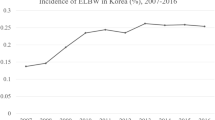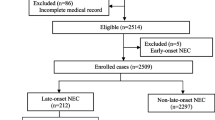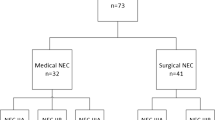Abstract
Objective
This study attempted to evaluate the association of early hypoalbuminemia with the risk of intestinal failure in gastroschisis patients.
Patients and methods
Neonates with gastroschisis treated at a tertiary children’s hospital over a 10-year period were initially categorized into groups based on the lowest serum albumin measurement during the first 7 days of life. Based on preliminary analysis, patients with serum albumin <1.5 g/dL were considered to have early severe hypoalbuminemia. Intestinal failure was defined as inability of the patient to wean from parenteral nutrition (PN) during the initial hospital admission, thus requiring home PN. Logistic regression modeling was performed to adjust for sex, gestational age, birth weight, and concomitant intestinal complications.
Results
One hundred and thirty-five gastroschisis patients were included, of whom 21% had early severe hypoalbuminemia. Patients with early severe hypoalbuminemia had a significantly higher risk of intestinal failure compared to those with higher albumin levels (26 vs. 8%, p = 0.015). On multivariable logistic regression modeling, early severe hypoalbuminemia was strongly associated with intestinal failure (OR 6.4, 95% CI 1.8–23.3, p = 0.005).
Conclusions
Early severe hypoalbuminemia appears to be an independent risk factor for long-term intestinal compromise rather than merely an indicator of overall illness. Further interventional studies are needed to determine whether clinical protocols utilizing judicious fluid administration, exogenous albumin, and early enteral feeding can improve clinical outcomes in gastroschisis.

Similar content being viewed by others
References
Lao OB, Larison C, Garrison MM, Waldhausen JH, Goldin AB (2010) Outcomes in neonates with gastroschisis in U.S. Children’s Hospitals. Am J Perinatol 27(1):97–101
Keys C, Drewett M, Burge DM (2008) Gastroschisis: the cost of an epidemic. J Pediatr Surg 43:654–657
Islam S (2008) Clinical care outcomes in abdominal wall defects. Curr Opin Pediatr 20:305–310
Abdullah F, Arnold MA, Nabaweesi R, Fischer AC, Colombani PM, Anderson KD, Lau H, Chang DC (2007) Gastroschisis in the United States 1988–2003: analysis and risk categorization of 4344 patients. J Perinatol 27:50–55
Casey L, Lee KH, Rosychuk R, Turner J, Huynh HQ (2008) 10-year review of pediatric intestinal failure: clinical factors associated with outcome. Nutr Clin Pract 23:436–442
Wada M, Kato T, Hayashi Y, Selvaggi G, Mittal N, Thompson J, Gonzalez M, Nishida S, Madariaga J, Tzakis A (2006) Intestinal transplantation for short bowel syndrome secondary to gastroschisis. J Pediatr Surg 41:1841–1845
Gutenberger JE, Miller DL, Dibbins AW, Gitlin D (1973) Hypogammaglobulinemia and hypoalbuminemia in neonates with ruptured omphaloceles and gastroschisis. J Pediatr Surg 8:353–359
Ford EG, Jennings LM, Andrassy RJ (1987) Serum albumin (oncotic pressure) correlates with enteral feeding tolerance in the pediatric surgical patient. J Pediatr Surg 22:597–599
Vincent JL, Dubois MJ, Navickis RJ, Wilkes MM (2003) Hypoalbuminemia in acute illness: is there a rationale for intervention? A meta-analysis of cohort studies and controlled trials. Ann Surg 237:319–334
Prien T, Backhaus N, Pelster F, Pircher W, Bunte H, Lawin P (1990) Effect of intraoperative fluid administration and colloid osmotic pressure on the formation of intestinal edema during gastrointestinal surgery. J Clin Anesth 2:317–323
Lohsiriwat V, Chinswangwatanakul V, Lohsiriwat S, Akaraviputh T, Boonnuch W, Methasade A, Lohsiriwat D (2007) Hypoalbuminemia is a predictor of delayed postoperative bowel function and poor surgical outcomes in right-sided colon cancer patients. Asia Pac J Clin Nutr 16:213–217
Kenny SE, Pierro A, Isherwood D, Donnell SC, Van Saene HK, Lloyd DA (1995) Hypoalbuminaemia in surgical neonates receiving parenteral nutrition. J Pediatr Surg 30:454–457
Porto BS, Jorge SM, de Assis MG (2005) Exogenous human albumin supplementation in total parenteral nutrition of critically ill newborns. J Pediatr (Rio J) 81:41–46
Vincent JL (2009) Relevance of albumin in modern critical care medicine. Best Pract Res Clin Anaesthesiol 23:183–191
Author information
Authors and Affiliations
Corresponding author
Rights and permissions
About this article
Cite this article
Snyder, C.W., Biggio, J.R., Bartle, D.T. et al. Early severe hypoalbuminemia is an independent risk factor for intestinal failure in gastroschisis. Pediatr Surg Int 27, 1155–1158 (2011). https://doi.org/10.1007/s00383-011-2921-5
Accepted:
Published:
Issue Date:
DOI: https://doi.org/10.1007/s00383-011-2921-5




